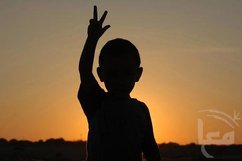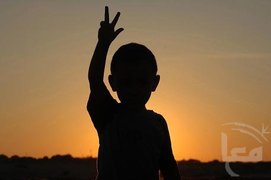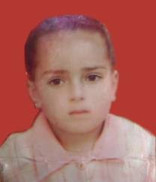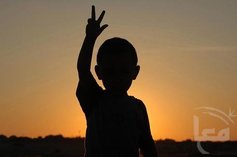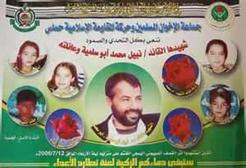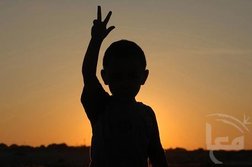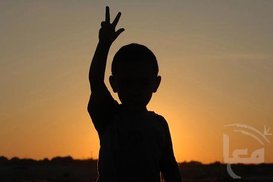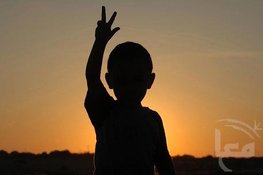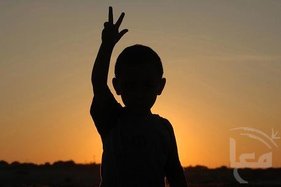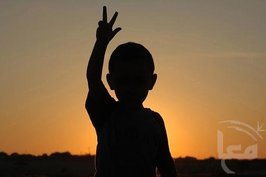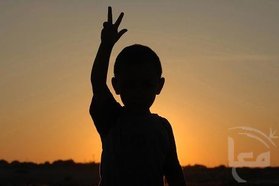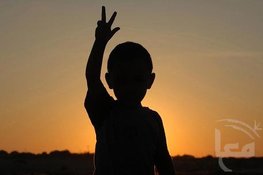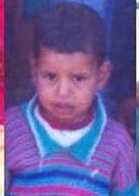
Mahmoud Musa Hasan abu-Ghazal 8
Killed 29 aug 2007
The mothers of all three children sat next to each other at their funeral while Israeli tanks at the border also sat stationed in the background. Yehya and Mahmoud’s mothers were each holding a picture of their sons, while Sara’s mother was holding a poster with Yehya and Mahmoud’s pictures with their names written below. In between their pictures was an image of a bouquet of red roses, with Sarah’s name underneath.
“Israel just wants to shed our blood,” said Yehya’s mother, choking on her words. “They didn’t do anything wrong … they had no rockets, no tanks … they were just playing,” added Mahmoud’s mother. They were all sitting on the mattress Yehya shared with Mahmoud. Mahmoud would sneak out of his mother’s bedroom at night to go and sleep by Yehya.
“They were meant to go together,” said Yehya’s mother, “Mahmoud would not have lived without Yehya. May God rest their souls together.”
The next day, on the BBC the Israeli military stated that the killing of Yehya, Mahmoud and Sarah was an accident: “at the very last second, it was apparent that they were children, but it was impossible to stop the explosion.”
There was no mention of holding accountable the soldiers who killed them or at the very least any offer of support to the families and the community. They cannot leave their area, or their land, as they have nowhere else to go.
Where’s the justice for 12-year-old Yehya and his childhood, or 10-year-old Mahmoud who wanted nothing more than to have the same things as his friend, or 10-year-old Sarah who never got to wear her new school clothes?
3 children were killed in Beit Hanoun by an Israel surface-to-surface missile fired near launchers of locally produced rockets.
There were no launching cells in the area at the time, and the children were at a considerable distance from the launching ladders.
Killed 29 aug 2007
The mothers of all three children sat next to each other at their funeral while Israeli tanks at the border also sat stationed in the background. Yehya and Mahmoud’s mothers were each holding a picture of their sons, while Sara’s mother was holding a poster with Yehya and Mahmoud’s pictures with their names written below. In between their pictures was an image of a bouquet of red roses, with Sarah’s name underneath.
“Israel just wants to shed our blood,” said Yehya’s mother, choking on her words. “They didn’t do anything wrong … they had no rockets, no tanks … they were just playing,” added Mahmoud’s mother. They were all sitting on the mattress Yehya shared with Mahmoud. Mahmoud would sneak out of his mother’s bedroom at night to go and sleep by Yehya.
“They were meant to go together,” said Yehya’s mother, “Mahmoud would not have lived without Yehya. May God rest their souls together.”
The next day, on the BBC the Israeli military stated that the killing of Yehya, Mahmoud and Sarah was an accident: “at the very last second, it was apparent that they were children, but it was impossible to stop the explosion.”
There was no mention of holding accountable the soldiers who killed them or at the very least any offer of support to the families and the community. They cannot leave their area, or their land, as they have nowhere else to go.
Where’s the justice for 12-year-old Yehya and his childhood, or 10-year-old Mahmoud who wanted nothing more than to have the same things as his friend, or 10-year-old Sarah who never got to wear her new school clothes?
3 children were killed in Beit Hanoun by an Israel surface-to-surface missile fired near launchers of locally produced rockets.
There were no launching cells in the area at the time, and the children were at a considerable distance from the launching ladders.
BEIT HANOUN MASSACRE-AUTUMN CLOUDS 1 - 26 NOV 2006
BEIT HANOUN MASSACRE-AUTUMN CLOUDS 1 - 26 NOV 2006
OPERATION SUMMER RAINS JUNE 30-AUG 31 2006
OPERATION SUMMER RAINS JUNE 30-AUG 31 2006
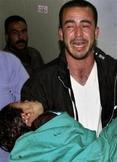
Akaber Zaed 8
Killed 17 mar 2006
Israeli Troops kill 8-year old child near Jenin
Friday evening, Israeli soldiers shot and killed an eight-year old child in the village of Al Yamoun, near the West Bank city of Jenin; another resident was moderately injured.
A Palestinian medical source in Jenin reported that Akaber Abdul-Rahman Zedan, 8, was shot dead after the soldiers fired with live ammunition at dozens of homes in the village; her body of the child was transferred to Khaleel Suleiman Hospital in Jenin.
The child who was killed by military fire was leaving her home adjacent to the surrounded home. She died of her wounds after the soldiers delayed an ambulance trying to evacuate her.
Also, an Israeli military spokesperson claimed that soldiers fired at a taxi after its driver failed to stop when ordered, and that the child was one of the passengers.
The family of the child, and eyewitnesses denied the military allegations and confirmed that the child was shot near her house.
Also, one resident identified as Kamal Taher Zayid, 27, was moderately injured by Israeli Special-Forces fire while they were surrounding a house in the town.
Soldiers fired at the surrounded house and around it; the injured resident was not in the house the force targeted.
An Israeli military source claimed that soldiers operated in Al Yamoun after receiving information that resistance fighters are hiding in one of the village's houses.
http://www.imemc.org/article/17429
Killed 17 mar 2006
Israeli Troops kill 8-year old child near Jenin
Friday evening, Israeli soldiers shot and killed an eight-year old child in the village of Al Yamoun, near the West Bank city of Jenin; another resident was moderately injured.
A Palestinian medical source in Jenin reported that Akaber Abdul-Rahman Zedan, 8, was shot dead after the soldiers fired with live ammunition at dozens of homes in the village; her body of the child was transferred to Khaleel Suleiman Hospital in Jenin.
The child who was killed by military fire was leaving her home adjacent to the surrounded home. She died of her wounds after the soldiers delayed an ambulance trying to evacuate her.
Also, an Israeli military spokesperson claimed that soldiers fired at a taxi after its driver failed to stop when ordered, and that the child was one of the passengers.
The family of the child, and eyewitnesses denied the military allegations and confirmed that the child was shot near her house.
Also, one resident identified as Kamal Taher Zayid, 27, was moderately injured by Israeli Special-Forces fire while they were surrounding a house in the town.
Soldiers fired at the surrounded house and around it; the injured resident was not in the house the force targeted.
An Israeli military source claimed that soldiers operated in Al Yamoun after receiving information that resistance fighters are hiding in one of the village's houses.
http://www.imemc.org/article/17429
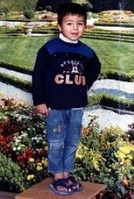
Raad Al-Batash 8
Killed 6 mar 2006
Five children killed by Israeli violence in a single day on Monday
An Israeli air strike killed Raad Al-Batash, 8, Mahmoud Al-Batash, 15, and Ahmad a-Sweisi, 14, on Monday. Sumiyya Al-Batch, the mother of Raad and Mahmoud, was also wounded. And in a separate incident, two brothers, Allam and Nidal Abu Saud, 14 and 15, were blown to pieces when an undetonated explosive left by the Israeli military in their neighborhood suddenly exploded near them.
Eight other passers-by were wounded in the air strike, most of them children, and Sukar's aunt, who lives nearby, died of a heart attack when she was told the news of the boys' deaths.
According to the Israeli military, the missile fired by the Israeli Airforce was targeting a car driven by two Palestinian resistance fighters, who were also killed by the attack. Military sources said that by the time the crowd was identified, it was already too late to divert the two missiles from their courses.
But a report by Israeli human rights group B'tselem called the attack a war crime, for the fact that it violated the principle of proportionality, a central tenet of international law. "Given the time and place chosen for the attack, the planners should have known that it was liable to injure many innocent civilians. Despite the extensive harm to civilians resulting from yesterday's attack, Israel has once again failed to provide any evidence regarding the necessity of the action or the lack of alternates that would entail lesser harm to civilians. These facts create a grave suspicion that yesterday's attack was disproportionate and thus constitutes a war crime", said a report by the group released Tuesday morning.
Over 800 Palestinian and 123 Israeli children under the age of 18 have been killed in Israel and the occupied territories since the current open conflict erupted in September of 2000, according to human rights groups.
Most of the Palestinian children killed by Israeli forces died of multiple gunshot wounds. But at least 40 were killed by explosives left behind by Israeli forces that did not explode on impact, like the Abu Saud brothers killed on Monday.
Children in occupied Palestine are prone to playing with bullet casings, artillery shells and other military paraphenalia left behind by Israeli forces when the troops withdraw from the neighborhoods. Sometimes the devices turn out to be live, and explode, killing or wounding the children.
A report by the Gaza City Palestinian Police Department in July 2005 showed that in 2003, 36 explosion incidents were recorded, claiming the lives of five children, and wounding 135. In 2004, police records documented 105 explosion incidents, in which two children were killed and 88 wounded. In 2005 until late June, the police statistics showed 35 explosion incidents, causing two deaths and 21 injuries, mostly children. Abu Azoum appealed to residents to make their children fully aware of the dangers of the remnants of explosives, not to pick them up or come near them, as they may contains unexploded parts.
The Palestinian police handles incidents of the explosion of the suspected devices and unexploded bombs. Saleh Abu Azoum, director of explosives engineering of the police, said, "We have a well-trained team equipped with the most modern equipment; they are capable of handling any kind of suspected object even if it is extremely dangerous."
However, Azoum noted that much of the necessary equipment was denied entry into Gaza by Israeli forces, saying, "The European Union (EU) provided the Palestinian police with four advanced automated explosive-detection devices but the Israeli occupation forces hindered the arrival of the rest of the EU-donated equipment." The Police Report also accused Israeli occupation forces of deliberately leaving behind explosives and landmines when retreating from Palestinian neighborhoods, causing deaths among innocent residents, in particular children who played with the objects.
Israeli Commander Eliezer Shakedi said on Tuesday morning that the Israeli Airforce makes "super-human efforts in order to reduce the number of innocent casualties in aerial strikes", and said that the number of civilian casualties has decreased dramatically over the last two years. Human rights groups, however, dispute that claim, saying that over 2/3 of the 3,829 Palestinians killed in the last five years have been civilians.
In February, the Resalah Center for Human Rights in Gaza issued a report condemning the killing of children by Israeli Occupation Forces. According to the report, Israeli Occupation Forces killed 797 children under the age of 18 between 28 September 2000 and 30 December 2005, approximately the time period of the Al Aqsa Intifada. The center pointed out that many children who weren't killed have been left with physical and psychological damage.
The center confirmed that those children were killed without any reason and that they hadn't committed any illegal or violent activities against the Israelis. The Center pointed out that many children were killed in aerial strikes. Other children were killed by random shooting and others as bystanders during targeted assassinations.
The Center criticized myths perpetuated in the Israeli and international media that Palestinian mothers send their children to die in order to receive more international sympathy, noting the high number of children killed at home or at school, or between home and school.
The report also stated that Israeli soldiers treat peaceful protests and marches as if they are battlefields, and shoot randomly into crowds, suggesting, "They should follow police methods of crowd dispersal to reduce danger to children in the area."
Resalah Center lawyer Ramzy Abu Jalhoum called on the international community and all human rights organizations to intervene immediately to protect the Palestinian children and to stop the Israeli killing of children.
After Monday's attack, Palestinian President Mahmoud Abbas said that it represents a dangerous escalation against the Palestinian people, adding that such escalations do not serve to push the peace process forward.
Hamas leaders called the air strike a "massacre". Sami Abu Zuhri, a Hamas spokesman, said that "if the international community remains quiet the situation will explode."
http://www.imemc.org/article/17187
Killed 6 mar 2006
Five children killed by Israeli violence in a single day on Monday
An Israeli air strike killed Raad Al-Batash, 8, Mahmoud Al-Batash, 15, and Ahmad a-Sweisi, 14, on Monday. Sumiyya Al-Batch, the mother of Raad and Mahmoud, was also wounded. And in a separate incident, two brothers, Allam and Nidal Abu Saud, 14 and 15, were blown to pieces when an undetonated explosive left by the Israeli military in their neighborhood suddenly exploded near them.
Eight other passers-by were wounded in the air strike, most of them children, and Sukar's aunt, who lives nearby, died of a heart attack when she was told the news of the boys' deaths.
According to the Israeli military, the missile fired by the Israeli Airforce was targeting a car driven by two Palestinian resistance fighters, who were also killed by the attack. Military sources said that by the time the crowd was identified, it was already too late to divert the two missiles from their courses.
But a report by Israeli human rights group B'tselem called the attack a war crime, for the fact that it violated the principle of proportionality, a central tenet of international law. "Given the time and place chosen for the attack, the planners should have known that it was liable to injure many innocent civilians. Despite the extensive harm to civilians resulting from yesterday's attack, Israel has once again failed to provide any evidence regarding the necessity of the action or the lack of alternates that would entail lesser harm to civilians. These facts create a grave suspicion that yesterday's attack was disproportionate and thus constitutes a war crime", said a report by the group released Tuesday morning.
Over 800 Palestinian and 123 Israeli children under the age of 18 have been killed in Israel and the occupied territories since the current open conflict erupted in September of 2000, according to human rights groups.
Most of the Palestinian children killed by Israeli forces died of multiple gunshot wounds. But at least 40 were killed by explosives left behind by Israeli forces that did not explode on impact, like the Abu Saud brothers killed on Monday.
Children in occupied Palestine are prone to playing with bullet casings, artillery shells and other military paraphenalia left behind by Israeli forces when the troops withdraw from the neighborhoods. Sometimes the devices turn out to be live, and explode, killing or wounding the children.
A report by the Gaza City Palestinian Police Department in July 2005 showed that in 2003, 36 explosion incidents were recorded, claiming the lives of five children, and wounding 135. In 2004, police records documented 105 explosion incidents, in which two children were killed and 88 wounded. In 2005 until late June, the police statistics showed 35 explosion incidents, causing two deaths and 21 injuries, mostly children. Abu Azoum appealed to residents to make their children fully aware of the dangers of the remnants of explosives, not to pick them up or come near them, as they may contains unexploded parts.
The Palestinian police handles incidents of the explosion of the suspected devices and unexploded bombs. Saleh Abu Azoum, director of explosives engineering of the police, said, "We have a well-trained team equipped with the most modern equipment; they are capable of handling any kind of suspected object even if it is extremely dangerous."
However, Azoum noted that much of the necessary equipment was denied entry into Gaza by Israeli forces, saying, "The European Union (EU) provided the Palestinian police with four advanced automated explosive-detection devices but the Israeli occupation forces hindered the arrival of the rest of the EU-donated equipment." The Police Report also accused Israeli occupation forces of deliberately leaving behind explosives and landmines when retreating from Palestinian neighborhoods, causing deaths among innocent residents, in particular children who played with the objects.
Israeli Commander Eliezer Shakedi said on Tuesday morning that the Israeli Airforce makes "super-human efforts in order to reduce the number of innocent casualties in aerial strikes", and said that the number of civilian casualties has decreased dramatically over the last two years. Human rights groups, however, dispute that claim, saying that over 2/3 of the 3,829 Palestinians killed in the last five years have been civilians.
In February, the Resalah Center for Human Rights in Gaza issued a report condemning the killing of children by Israeli Occupation Forces. According to the report, Israeli Occupation Forces killed 797 children under the age of 18 between 28 September 2000 and 30 December 2005, approximately the time period of the Al Aqsa Intifada. The center pointed out that many children who weren't killed have been left with physical and psychological damage.
The center confirmed that those children were killed without any reason and that they hadn't committed any illegal or violent activities against the Israelis. The Center pointed out that many children were killed in aerial strikes. Other children were killed by random shooting and others as bystanders during targeted assassinations.
The Center criticized myths perpetuated in the Israeli and international media that Palestinian mothers send their children to die in order to receive more international sympathy, noting the high number of children killed at home or at school, or between home and school.
The report also stated that Israeli soldiers treat peaceful protests and marches as if they are battlefields, and shoot randomly into crowds, suggesting, "They should follow police methods of crowd dispersal to reduce danger to children in the area."
Resalah Center lawyer Ramzy Abu Jalhoum called on the international community and all human rights organizations to intervene immediately to protect the Palestinian children and to stop the Israeli killing of children.
After Monday's attack, Palestinian President Mahmoud Abbas said that it represents a dangerous escalation against the Palestinian people, adding that such escalations do not serve to push the peace process forward.
Hamas leaders called the air strike a "massacre". Sami Abu Zuhri, a Hamas spokesman, said that "if the international community remains quiet the situation will explode."
http://www.imemc.org/article/17187
